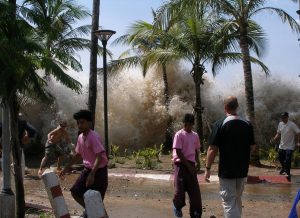
The 2004 Indian Ocean tsunami at Ao Nang, Krabi Province, Thailand.
Credit: David Rydevik, Stockholm, Sweden, Public Domain.
Tsunamis are destructive natural hazards that can demolish coastal communities and devastate coastlines thousands of kilometers away. Tsunamis have been responsible for the loss of over 420,000 lives and billions of dollars of damage to coastal structures and habitats since 1850, according to NOAA.
Tsunamis cannot be prevented, but their impacts can be mitigated through community preparedness, timely warning systems and effective emergency management response. Several American Geophysical Union scientists are available to comment on the science of tsunamis, including tsunami generation, hazards, forecasting, warning systems and preparedness.
Diego Melgar is an assistant professor of geophysics at the University of Oregon in Eugene, Oregon. His research focuses on understanding the nature of large earthquakes. He specializes in the hazards associated with these large events, specifically tsunamis and strong shaking. He studies how large tsunamis affect the coastlines closest to an event and also designs tsunami early warning systems.
Email: [email protected]
Phone: +1 (541) 346-3488
Cindi Preller is a duty scientist, educator, and geologist at NOAA’s Pacific Tsunami Warning Center (PWTC) in Anchorage, Alaska. She actively warns and educates the public about tsunamis. Prior to joining PTWC, she was on duty at the National Tsunami Warning Center in Palmer, Alaska. She has spent many years working with the public and emergency managers as a subject matter expert on tsunamis.
Email: [email protected]
Phone: +1 (808) 725-6306
Y. Tony Song is a research scientist in oceanography at NASA’s Jet Propulsion Laboratory in Pasadena, California. He specializes in satellite observations of sea level and Earth’s gravity changes. His recent studies have focused on tsunami formation theory and early warning systems using GPS technology.
Email: [email protected]
Phone: +1 (818) 393-4876
Christa von Hillebrandt-Andrade is the manager of NOAA’s Caribbean Tsunami Warning Program in Mayagüez, Puerto Rico. Her expertise spans all aspects of the tsunami and coastal hazards warning system for the Caribbean and adjacent regions (from Bermuda thru Brazil), including hazard and risk assessment, seismic and sea level monitoring, tsunami forecasting and warning and awareness and readiness. She is fluent in both English and Spanish.
Email: [email protected]
Phone: +1 (787) 249-8307
Robert Weiss is a professor of natural hazards at Virginia Polytechnic Institute and State University in Blacksburg, Virginia. His studies the impact of tsunamis in the geologic past, today and in the future. He develops computer models and uses data analytics to translate the geologic record of tsunamis into numbers that improve the understanding of the tsunami hazard in the past and today. He also studies how tsunami hazards will change in the future.
Email: [email protected]
Phone: +1 (540) 231-2334
Looking for experts in other topic areas? Visit AGU’s Stay Informed page for up-to-date expert lists.